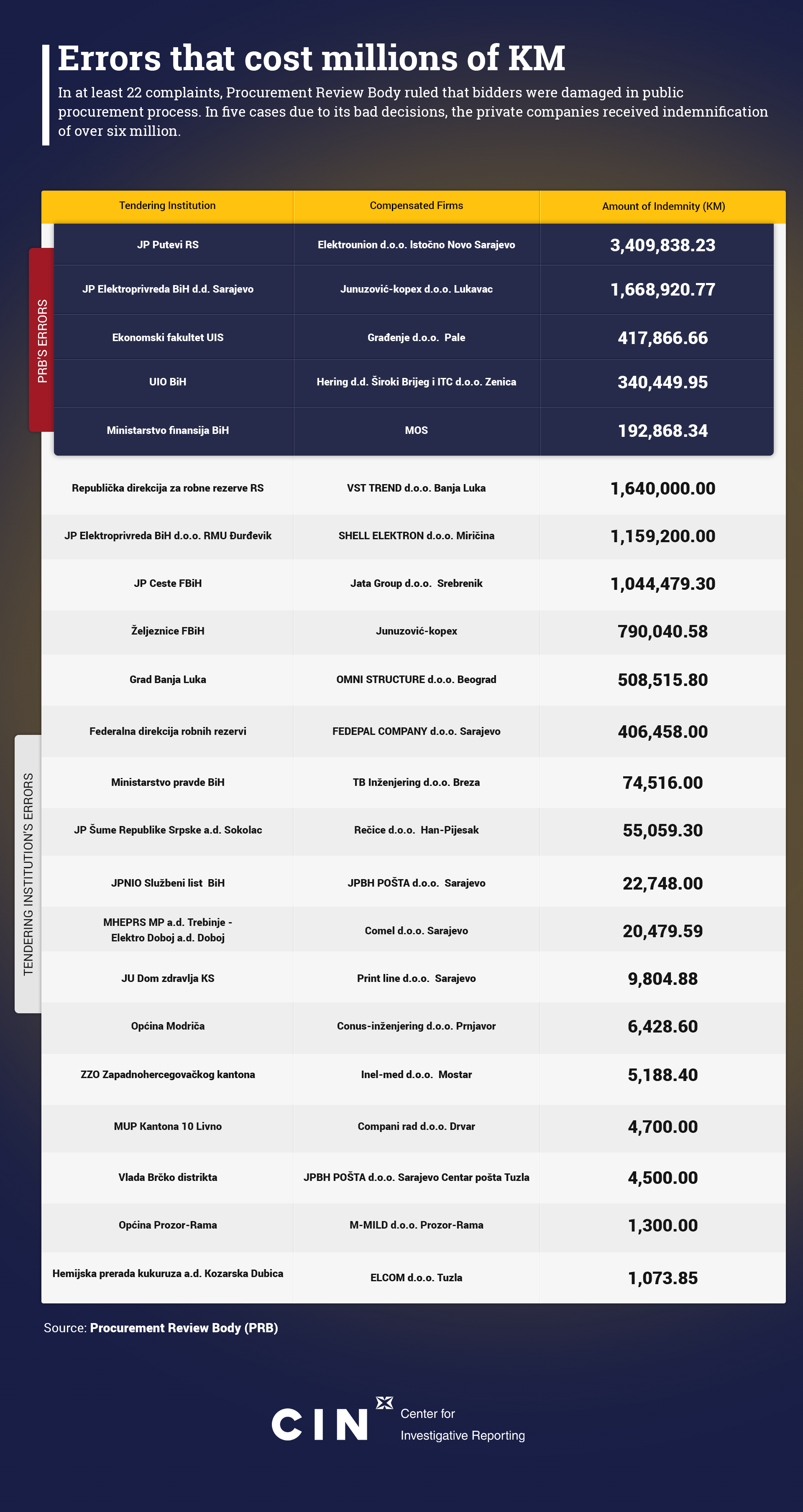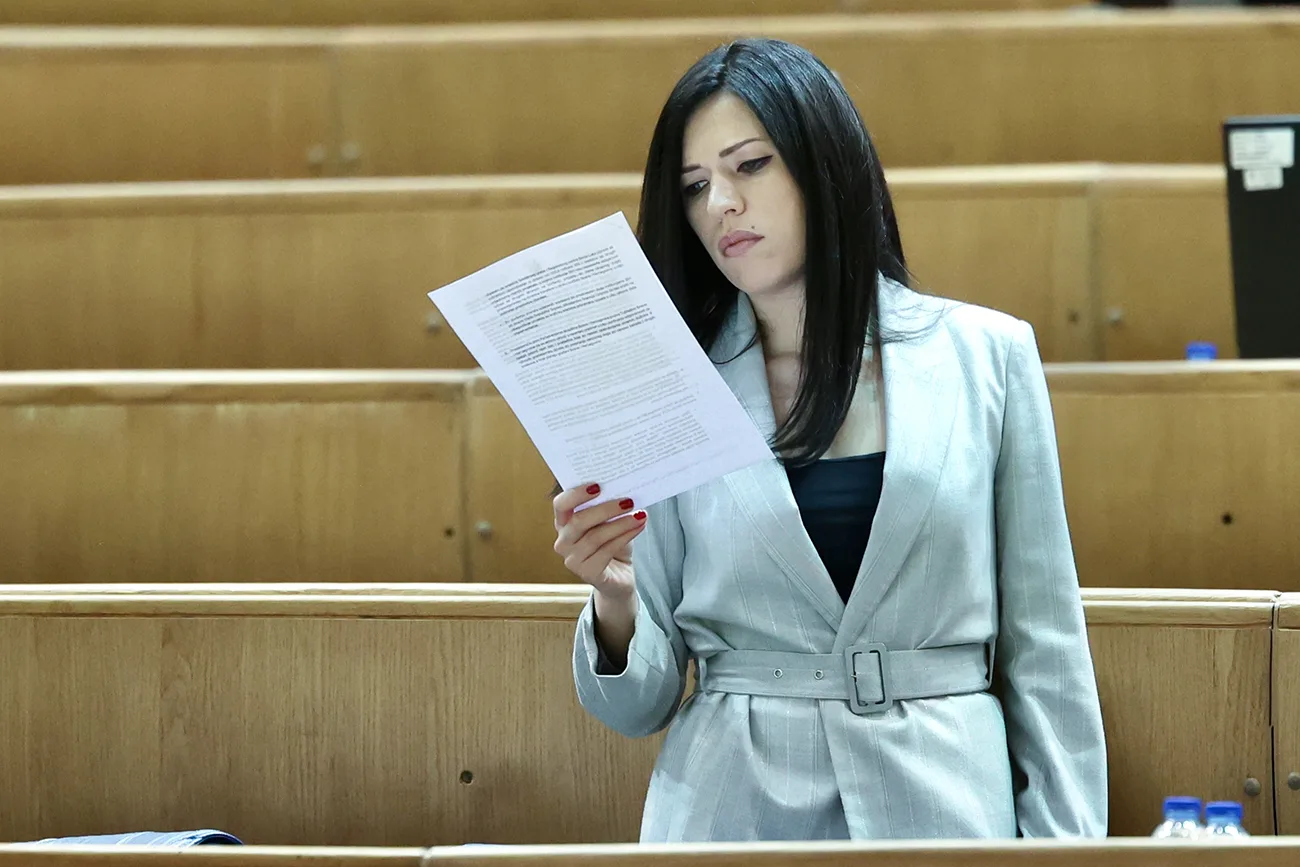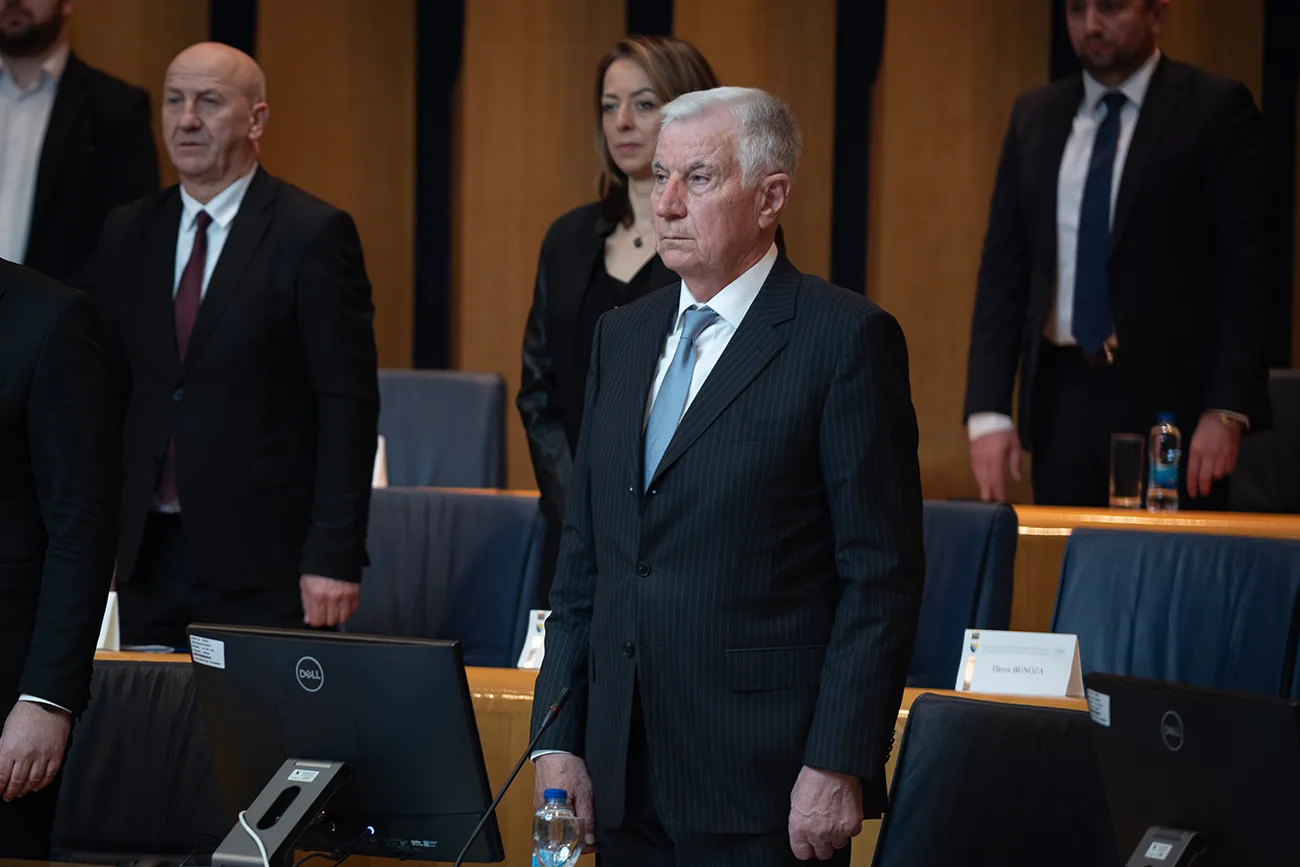After the Electricity Generator and Supplier of Bosnia and Herzegovina (EPBiH) awarded a tender for fuel supply to “Hifa Petrol” of Sarajevo, its competitors appealed to the Procurement Review Body (PRB) complaining that the winning bidder did not meet the tender’s requirements.
The PRB had thrown out an appeal from Junuzović-kopex in Lukavac, but the Court of BiH ordered the PRB to change its decision and it did.
However, since EPBiH had already signed the contract with Hifa Petrol, it had to pay nearly 1.7 million KM in indemnities to the Lukavac firm because of the PRB’s bad decision.
Don't want to miss our stories?
Sign up for our newsletter.
Don't want to miss our stories?
Sign up for our newsletter.
This is not an isolated case. Reporters from the Center for Investigative Reporting in Sarajevo (CIN) reviewed 22 public procurement procedures in which PRB ruled over combined damages of nearly 12 million KM. They found that public institutions and public companies had to pay half of this money because of bad decisions by the PRB. Like Junuzović-kopex, MOS, Hering, Elektrounion and Građenje also got indemnity payments.
PRB’s members who CIN reporters talked to said that errors could happen because certain legal provisions are interpreted differently, but they also said that tendering institutions err as well.
Unlike the public institutions which are sanctioned for their errors, the PRB members’ bad decisions have not been punished because the Law does not hold them accountable.
The PRB is a seven-member independent institution that monitors implementation of the Law on Public Procurement. It is made up of lawyers who have passed the bar exam and experts in public procurement, transport, construction or strategic business management. The BiH Parliamentary Assembly selects them.
Between 2012 and the end of 2015, according to its annual reports, the PRB issued 45 indemnifications. After six months of waiting, CIN reporters still have not received copies of all these, because the agency explained, officials could not track them down in their archive.
Controversial Decisions in Public Procurement
Until mid-2014, the Law on Public Procurement in BiH dealt with compensation for bidders harmed during the public procurement process. The PRB had the final word when it came to how much indemnification — it could not go over ten percent of the bid’s value. Since then, the courts took over from the PRB on deciding amount of indemnification.
In April 2013, the EPBiH put out a tender for fuel it would supply mines. Three months later it selected Hifa Petrol as the low bidder. Junuzović-kopex complained that Hifa Petrol did not show in its bid that at least 50 percent of its fuel was produced in BiH, which was a condition under a so-called “preferential treatment of local (products)” requirement.
The EPBiH did not accept the complaint, stating that the fuel was of local provenance and there was a valid certificate to prove it. Junuzović-kopex Director Saša Selimović complained to PRB asking it to rescind the award to Hifa Petrol.
The PRB turned down his complaint a month later and concluded that EPBiH has done the right thing.
Junuzović-kopex went next to the Court of BiH which concluded that the PRB did not look into whether EPBiH had correctly conducted the procurement process and reviewed if the bidders were qualified. The Court ordered the PRB to issue a new decision in line with Court’s guidelines.
In a new decision, the PRB’s members concluded that the EPBiH violated the law in never explaining how bidders were to prove the fuel’s provenance.
The decision came too late for Junuzović-kopex, because the EPBiH had already signed a contract with Hifa Petrol and the mines. The PRB assessed that the firm was damaged for nearly 1.7 million KM which EPBiH was to pay back.
The EPBiH’s former director general Elvedin Grabovica said that the company acted in line with the PRB’s decision and that it was not responsible for the damage: “I say with full responsibility that there was no damage there and that we did just what the law prescribed”, said Grabovica. He added that EPBIH paid the indemnity because it respected the PRB.
Grabovica asked the BiH Prosecutor’s Office to review the legality of the decision. He wrote in a memo that the lack of professionalism among individuals and groups in PRB has hurt EPBiH. He mentioned no names. “Here the EPBiH as a state-owned company was definitely damaged at the expense of a private company that simply collected the indemnity,” said Grabovica.
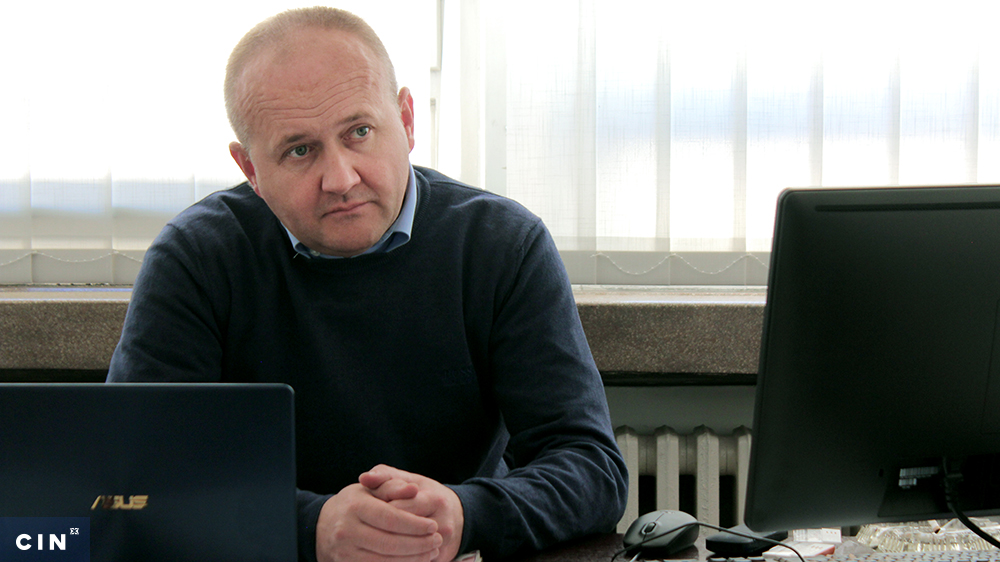
Wrongful Price Decrease
EPBiH is not the only company that lost money following the body’s decision. The Indirect Taxation Authority (UIO) in BiH paid over 340,000 KM in indemnities to the consortium of two firms: Hering from Široki Brijeg and ITC from Zenica. These firms bid on a tender for construction of Bijača border crossing, but did not win a contract.
In February 2013, UIO’s public procurement panel looked into the quotes and proposed as winning bidders the consortium consisting of A3 from Široki Brijeg and Putovi from Grude. They had the cheapest offer.
Hering and ITC consortium was of the opinion that the price of their competitors was falsely lower. UIO’s director Miro Džakula stopped the award process when a complaint was made. However, the PRB concluded that UIO did not violate the law. UIO spokesperson Ratko Kovačević said that based on PRB’s decision his institution concluded a contract with A3 and Putovi.
The Consortium then took the PRB to court and the Court of BIH upheld the complaint and in its ruling stated that the PRB and the UIO were wrong to interpret that the winning firms should have had a price reduction of 10 rather than 5 percent.
The PRB had to reconsider its decision and as with the EPBiH case, it came up with a decision that closely followed the Court’s ruling. It concluded that UIO made a mistake by lowering the offer of the firms with which it later signed the contract.
Afterwards, the UIO unsuccessfully sued the PRB because it had to pay an indemnity that Kovačević said was too high.
“During all this procedure we have stuck to the Procurement Review Body’s decisions and did according to the decisions and practically we could not have acted otherwise,” he said.
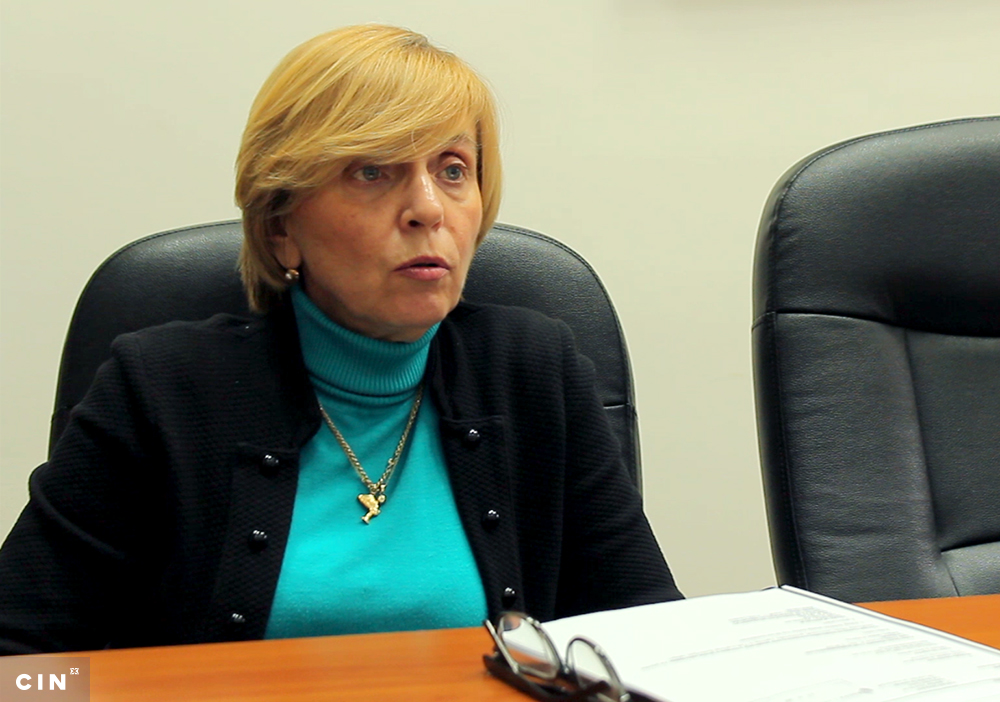
Former PRB’s member and chairman Amir Pilav said that the law should prescribe the obligations and responsibilities of PRB’s members or state that there are none: “However, when it’s like it is now, if nothing had been written, than it’s worse than anything else”.
Another former PRB member Ostoja Kremenović said that members could not be held accountable for interpreting legislation differently than a court.
Even though the PRB officials admit to errors, the insist that they were first made by the institutions and companies, and economic damage begins there.
“If they had done everything they should at the moment when we made a decision, than it would have not come to this,” said Nikolina Silak with the PRB for nine years.
However, PRB’s members are hired to insure that the institutions are correctly applying the Law. If PRB established that an institution has violated the Law, it can rescind its decision, order errors fixed or stop the procurement. Sanel Nezirić, a lawyer and a certified trainer in public procurement, said that the granting of most indemnity decisions is justified, but that amounts are manipulated: “I think that there is a lot of irregularities when it comes to awarding the damages, especially with regard to these big amounts”.
Đinita Fočo, former director of Public Procurement Agency, told CIN that high awards could have been prevented if public companies and institutions took a serious interest in the bidder’s appeals.
Requirements for a Company
The public company Putevi Republike Srpske (RS) paid 3.4 million KM indemnity to a company did not even bid on its tender. The state prosecutor’s office got involved and is investigating the PRB member Dragan Vukajlović.
An East Sarajevo firm Elektrounion did not bid for a road maintenance tender that was put out in 2012. In a memo sent to CIN reporters the firm stated that the tender requirements were made to fit one company.
The firm first complained to Putevi RS and then to the PRB. Chairman Amir Pilav ordered Putevi RS to halt the procurement until PRB decided. That lasted for 15 days.
PRB members CIN interviewed said that there is no deadline for deliberating appeal.
Then director of Putevi RS, Nedeljko Knežević, said that the procurement process had to resume in order not to compromise traffic security, while Elektrounion complained that it was damaged and asked for indemnification.

PRB members concluded that Putevi RS violated the law by signing the contract and not letting Elektrounion prepare its offer. The PRB estimated that the company was damaged to the tune of several millions. After the public company tried to appeal and failed, it paid Elektrounion.
“If someone took from your account 3.4 million KM for the work they have not done, which they could not have done, which they did not even have the intention of doing…I see that as a business tragedy,” said Živodar Bosančić, the executive director for legal issues in Putevi RS.
Kremenović, who voted with other PRB members in favor of awarding damages, said that the public company had made a mistake and that an expert witness decided on the amount of indemnity.
“Everyone voted and I have voted. I would have voted again. Why not clear the way so that everyone can bid?” Kremenović told CIN.
Even though it lost money, Putevi RS took the case before the Court of BiH. In October 2016, the Court of BiH concluded that there was no reason to award more than 3 million KM in damages and it rescinded PRB’s decision.
“Hence, the cost of indemnities cannot be a basis to award someone or even for their unjust enrichment, that is, for acquiring gain that is an order of magnitude bigger than the expense of preparing a bid”, the court wrote in its ruling.
Meanwhile, the PRB had to issue a new decision on indemnity — not yet done.
Following the ruling, the officers of the State Investigation and Protection Agency (SIPA) arrested Elektrounion director Duško Lazarević and a PRB member Dragan Vukajlović on suspicion of illegally awarding damages. The BiH Prosecutor’s Office has not yet filed an indictment, but officials say that they’re investigating.
Putevi RS tried to recoup the indemnity, but has not yet succeeded. Bosančić said that his company does not have confidence in people who work for PRB, but that it had to act according to its decisions, like everyone else.
Kremenović said that if it was proved that PRB has committed a mistake, the institutions could sue it: “This would probably lead to an increase in responsibility”.
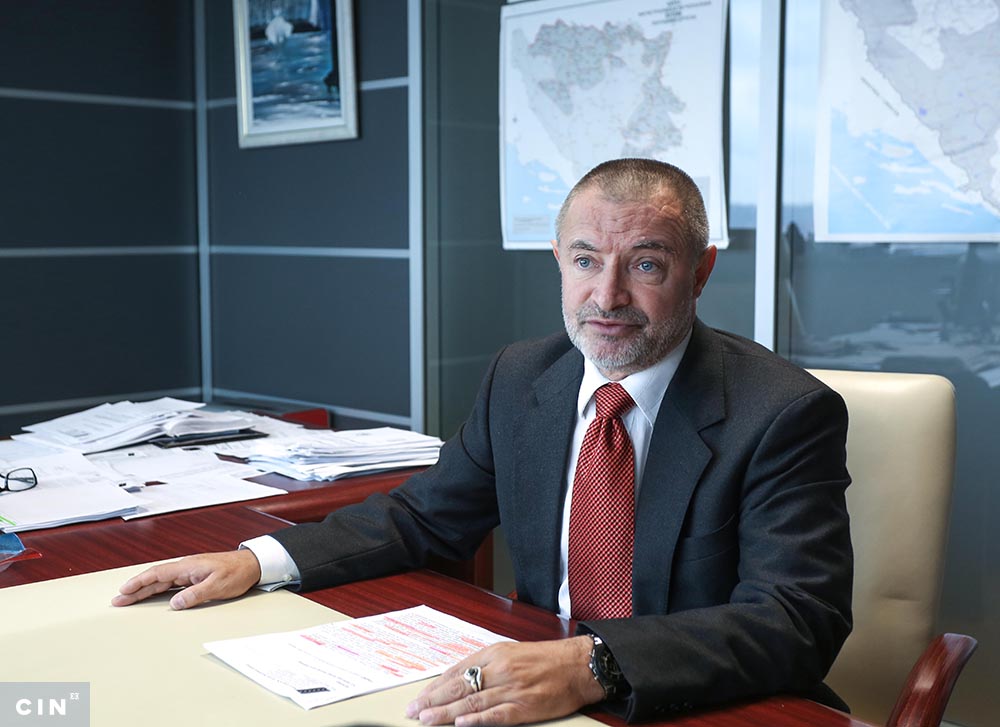
Court damages
The new Law on Public Procurement has taken out of PRB’s hands the possibility to decide on the indemnity requests. This is now under the court’s jurisdiction. The PRB’s member Jelena Gotovac said that it was better now that judges were ruling on the amount of indemnities: “I think that a court has more experience in this regard, when it comes to awarding damages”.
Representatives from the Public Procurement Agency and the PRB were not aware if courts had handed down any other ruling.
The institutions and companies that have lost money by paying indemnities said that the amounts were high because the companies that got money never concluded contracts with the institutions. They, therefore, never spent money or used goods or services.
Enver Zornić, the owner of MOS company, said that after eight years of proceedings before the PRB and the Court of BiH, his company collected less than 200,000 KM. Zornić told CIN that after all those years this money meant nothing to him. “To begin with, we have suffered enormous damages because we have lost the contract”.
In 2007, Zornić’s firm put in the most favorable bid to furnish the Friendship building between BiH and Greece. Despite that, the contract was not concluded because Fuad Kasumović, then BiH deputy minister of finances and treasury, rescinded the award decision and gave the contract to companies whose offer was 4 million KM more expensive.
That’s why Zornić asked for indemnity.
“This is a damage that Kasumović has done to the state, to all of us…After those eight years of lawyer’s costs and our costs of work on all of it – that simply has no price”, Zornić told CIN.




